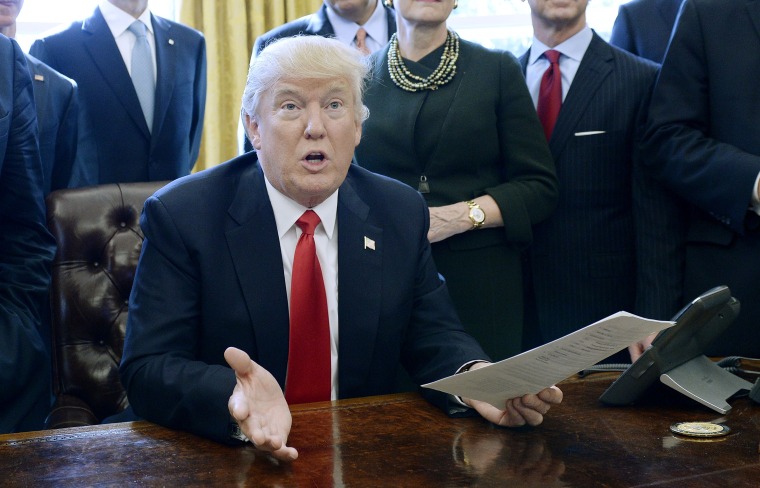A reporter asked Donald Trump in June whether he'd be willing to answer questions about the Russia scandal under oath. "One hundred percent," the president responded.
In a follow-up, a reporter asked, "So if Robert Mueller wanted to speak with you about that, you would be willing to talk to him?" Trump, referring to comments he made about not pressuring former FBI Director James Comey, responded, "I would be glad to tell him exactly what I just told you."
Last week, however, the president's posture changed. Asked at a press conference at Camp David whether he's still committed to speaking with Mueller, Trump hedged, refusing to answer the question directly. A few days later, at an event alongside the prime minister of Norway, Trump faced a similar question. The Republican's response was long, meandering, and not altogether coherent, but he concluded that it "seems unlikely" that he'd answer the special counsel's questions.
The president's odd rhetoric notwithstanding, NBC News reported last week that the logistics and scope of an interview with Trump remain the subject of discussion between the special counsel's office and the president's lawyers. Bloomberg Politics reported late Friday that talks between Trump's legal team ad Mueller's team are "expected to continue ... despite comments from Trump suggesting an interview is unlikely."
As long as we're on the subject, it's also worth noting the president's comments on the subject to the Wall Street Journal the other day, because while it wasn't the part of the interview that generated the most news, it offered an interesting peek into Trump's thinking.
At the outset, Trump insisted, "There has never been, in the history -- in the history of an administration anybody that was more open than we were," which seemed like an odd thing for a president with secret tax returns, secret visitor logs, and secret customers to say.
He added, in response to a question that wasn't asked, "I never got a phone call from Russia. I didn't have a tweet. I didn't have a -- I had nothing. I didn't have an email. I didn't have a meeting." To the extent that reality still matters, in October 2015 -- four months into his campaign -- then-candidate Trump signed a letter of intent with a Russian company about advancing a stalled Trump Tower development project in Moscow. (The financing for the deal was coming by way of a bank owned and controlled by Putin's government.)
But the same WSJ interview also featured this exchange:
WSJ: Well, Mueller's also looking at some other areas, right? Like obstruction of justice...TRUMP: Well allow -- let me -- (inaudible). So, they make up a crime, and the crime doesn't exist. And then they say obstruction. And how could there be obstruction on firing Comey? When the man who's in charge of it wrote a letter that was far stronger than anything I would have written. He was in charge -- Deputy Rosenstein. He wrote a letter that's far stronger than even what I say.
The president was referring to a memo Rod Rosentein wrote to help rationalize Comey's dismissal, but Trump has already admitted that the memo wasn't important to him and he fired the then-FBI director in order to help derail the investigation into the Russia scandal. Indeed, Trump personally bragged to Russian officials that Comey's firing was about relieving "pressure" created by the controversy.
And yet, to hear Trump tell it, the very idea that he obstructed justice by ousting the FBI director investigating the scandal is practically an impossibility.
In the same interview, he added, "And how can they talk about obstruction when I was the most open person, in history?"
Determining what the president does and doesn't understand is an inherently tricky exercise, but it's hardly outrageous to suspect Trump may be surprised by the meaning of "obstruction of justice."
